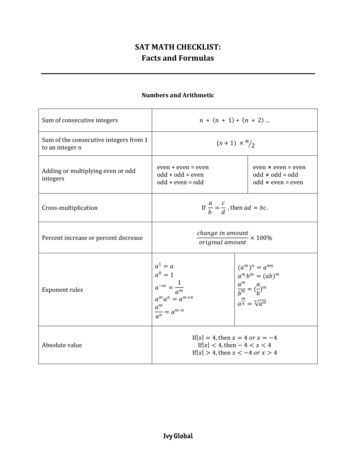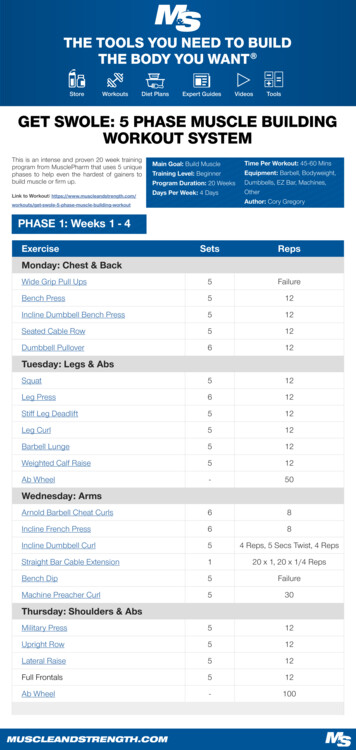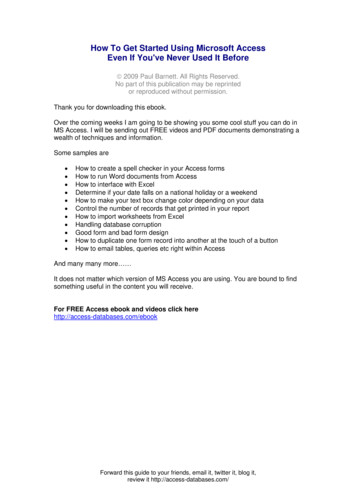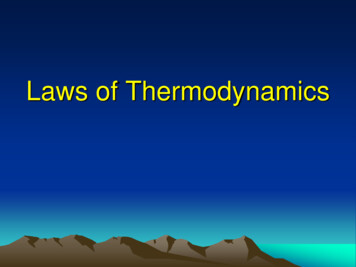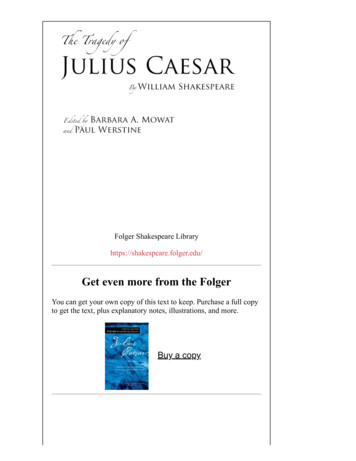
Transcription
Folger Shakespeare Libraryhttps://shakespeare.folger.edu/Get even more from the FolgerYou can get your own copy of this text to keep. Purchase a full copyto get the text, plus explanatory notes, illustrations, and more.Buy a copy
ContentsFrontMatterFrom the Director of the Folger ShakespeareLibraryTextual IntroductionSynopsisCharacters in the PlayACT 1Scene 1Scene 2Scene 3ACT 2Scene 1Scene 2Scene 3Scene 4ACT 3Scene 1Scene 2Scene 3ACT 4Scene 1Scene 2Scene 3ACT 5Scene 1Scene 2Scene 3Scene 4Scene 5
From the Director of the Folger ShakespeareLibraryIt is hard to imagine a world without Shakespeare. Since theircomposition four hundred years ago, Shakespeare’s plays and poemshave traveled the globe, inviting those who see and read his works tomake them their own.Readers of the New Folger Editions are part of this ongoing processof “taking up Shakespeare,” finding our own thoughts and feelingsin language that strikes us as old or unusual and, for that very reason,new. We still struggle to keep up with a writer who could think amile a minute, whose words paint pictures that shift like clouds.These expertly edited texts are presented to the public as a resourcefor study, artistic adaptation, and enjoyment. By making the classictexts of the New Folger Editions available in electronic form as TheFolger Shakespeare (formerly Folger Digital Texts), we place atrusted resource in the hands of anyone who wants them.The New Folger Editions of Shakespeare’s plays, which are the basisfor the texts realized here in digital form, are special because of theirorigin. The Folger Shakespeare Library in Washington, DC, is thesingle greatest documentary source of Shakespeare’s works. Anunparalleled collection of early modern books, manuscripts, andartwork connected to Shakespeare, the Folger’s holdings have beenconsulted extensively in the preparation of these texts. The Editionsalso reflect the expertise gained through the regular performance ofShakespeare’s works in the Folger’s Elizabethan Theatre.I want to express my deep thanks to editors Barbara Mowat and PaulWerstine for creating these indispensable editions of Shakespeare’sworks, which incorporate the best of textual scholarship with arichness of commentary that is both inspired and engaging. Readerswho want to know more about Shakespeare and his plays can followthe paths these distinguished scholars have tread by visiting theFolger either in-person or online, where a range of physical anddigital resources exists to supplement the material in these texts. Icommend to you these words, and hope that they inspire.Michael WitmoreDirector, Folger Shakespeare Library
Textual IntroductionBy Barbara Mowat and Paul WerstineUntil now, with the release of The Folger Shakespeare (formerlyFolger Digital Texts), readers in search of a free online text ofShakespeare’s plays had to be content primarily with using theMoby Text, which reproduces a late-nineteenth century version ofthe plays. What is the difference? Many ordinary readers assume thatthere is a single text for the plays: what Shakespeare wrote. ButShakespeare’s plays were not published the way modern novels orplays are published today: as a single, authoritative text. In somecases, the plays have come down to us in multiple publishedversions, represented by various Quartos (Qq) and by the greatcollection put together by his colleagues in 1623, called the FirstFolio (F). There are, for example, three very different versions ofHamlet, two of King Lear, Henry V, Romeo and Juliet, and others.Editors choose which version to use as their base text, and thenamend that text with words, lines or speech prefixes from the otherversions that, in their judgment, make for a better or more accuratetext.Other editorial decisions involve choices about whether anunfamiliar word could be understood in light of other writings of theperiod or whether it should be changed; decisions about words thatmade it into Shakespeare’s text by accident through four hundredyears of printings and misprinting; and even decisions based oncultural preference and taste. When the Moby Text was created,for example, it was deemed “improper” and “indecent” for Mirandato chastise Caliban for having attempted to rape her. (See TheTempest, 1.2: “Abhorred slave,/Which any print of goodness wilt nottake,/Being capable of all ill! I pitied thee ”). All Shakespeareeditors at the time took the speech away from her and gave it to herfather, Prospero.The editors of the Moby Shakespeare produced their text longbefore scholars fully understood the proper grounds on which tomake the thousands of decisions that Shakespeare editors face. TheFolger Library Shakespeare Editions, on which the FolgerShakespeare texts depend, make this editorial process as nearlytransparent as is possible, in contrast to older texts, like the Moby ,which hide editorial interventions. The reader of the FolgerShakespeare knows where the text has been altered because editorialinterventions are signaled by square brackets (for example, fromOthello: “ If she in chains of magic were not bound, ”), half-squarebrackets (for example, from Henry V: “With blood and sword andfire to win your right,”), or angle brackets (for example, from
Hamlet: “O farewell, honest soldier. Who hath relieved/you?”). Atany point in the text, you can hover your cursor over a bracket formore information.Because the Folger Shakespeare texts are edited in accord withtwenty-first century knowledge about Shakespeare’s texts, the Folgerhere provides them to readers, scholars, teachers, actors, directors,and students, free of charge, confident of their quality as texts of theplays and pleased to be able to make this contribution to the studyand enjoyment of Shakespeare.
SynopsisCaesar’s assassination is just the halfway point of Julius Caesar. Thefirst part of the play leads to his death; the second portrays theconsequences. As the action begins, Rome prepares for Caesar’striumphal entrance. Brutus, Caesar’s friend and ally, fears thatCaesar will become king, destroying the republic. Cassius and othersconvince Brutus to join a conspiracy to kill Caesar.On the day of the assassination, Caesar plans to stay home at theurging of his wife, Calphurnia. A conspirator, Decius Brutus,persuades him to go to the Senate with the other conspirators and hisfriend, Mark Antony. At the Senate, the conspirators stab Caesar todeath. Antony uses a funeral oration to turn the citizens of Romeagainst them. Brutus and Cassius escape as Antony joins forces withOctavius Caesar.Encamped with their armies, Brutus and Cassius quarrel, then agreeto march on Antony and Octavius. In the battle which follows,Cassius, misled by erroneous reports of loss, persuades a slave to killhim; Brutus’s army is defeated. Brutus commits suicide, praised byAntony as “the noblest Roman of them all.”
Characters in the PlayJULIUS CAESARCALPHURNIA,his wifeServant to themMARCUS BRUTUSPORTIA,his wifeLUCIUS, their servantCAIUS CASSIUSCASCACINNApatricians who, with Brutus,conspire against CaesarDECIUS BRUTUSCAIUS LIGARIUSMETELLUS CIMBERTREBONIUSCICEROsenatorsPUBLIUSPOPILIUS LENAFLAVIUSMARULLUStribunesMARK ANTONYLEPIDUSrulers of Rome in Acts 4 and 5OCTAVIUSServant to AntonyServant to OctaviusLUCILIUSTITINIUSMESSALAVARROCLAUDIUSYOUNG CATOSTRATOVOLUMNIUS(nonspeaking)FLAVIUS (nonspeaking)LABEODARDANUSCLITUSA CarpenterA CobblerA SoothsayerARTEMIDORUSofficers and soldiers in thearmies of Brutus and Cassius
First, Second, Third, and Fourth PlebeiansCINNA the poetPINDARUS, slave to Cassius, freed upon Cassius’s deathFirst, Second, Third, and Fourth Soldiers in Brutus’s armyAnother PoetA MessengerFirst and Second Soldiers in Antony’s armyCitizens, Senators, Petitioners, Plebeians, Soldiers
ACT 1Scene 1Enter Flavius, Marullus, and certain Commoners,including a Carpenter and a Cobbler, over the stage.FLAVIUSFTLN 0001FTLN 0002FTLN 0003FTLN 0004FTLN 0005FTLN 0006Hence! Home, you idle creatures, get you home!Is this a holiday? What, know you not,Being mechanical, you ought not walkUpon a laboring day without the signOf your profession?—Speak, what trade art thou?CARPENTER Why, sir, a carpenter.5MARULLUSFTLN 0007FTLN 0008FTLN 0009FTLN 0010FTLN 0011Where is thy leather apron and thy rule?What dost thou with thy best apparel on?—You, sir, what trade are you?COBBLER Truly, sir, in respect of a fine workman, I ambut, as you would say, a cobbler.10MARULLUSFTLN 0012FTLN 0013FTLN 0014FTLN 0015But what trade art thou? Answer me directly.A trade, sir, that I hope I may use with a safeconscience, which is indeed, sir, a mender of badsoles.COBBLERFLAVIUSFTLN 0016FTLN 0017What trade, thou knave? Thou naughty knave, whattrade?715
9FTLN 0018FTLN 0019Julius CaesarACT 1. SC. 1Nay, I beseech you, sir, be not out with me.Yet if you be out, sir, I can mend you.COBBLERMARULLUSFTLN 0020FTLN 0021FTLN 0022FTLN 0023FTLN 0024FTLN 0025FTLN 0026FTLN 0027FTLN 0028FTLN 0029What mean’st thou by that? Mend me, thou saucyfellow?COBBLER Why, sir, cobble you.FLAVIUS Thou art a cobbler, art thou?COBBLER Truly, sir, all that I live by is with theawl. I meddle with no tradesman’s matters norwomen’s matters, but withal I am indeed, sir, asurgeon to old shoes: when they are in great danger,I recover them. As proper men as ever trod uponneat’s leather have gone upon my handiwork.2025FLAVIUSFTLN 0030FTLN 0031FTLN 0032FTLN 0033FTLN 0034FTLN 0035But wherefore art not in thy shop today?Why dost thou lead these men about the streets?COBBLER Truly, sir, to wear out their shoes, toget myself into more work. But indeed, sir, wemake holiday to see Caesar and to rejoice in histriumph.3035MARULLUSFTLN 0036FTLN 0037FTLN 0038FTLN 0039FTLN 0040FTLN 0041FTLN 0042FTLN 0043FTLN 0044FTLN 0045FTLN 0046FTLN 0047FTLN 0048FTLN 0049FTLN 0050Wherefore rejoice? What conquest brings he home?What tributaries follow him to RomeTo grace in captive bonds his chariot wheels?You blocks, you stones, you worse than senselessthings!O you hard hearts, you cruel men of Rome,Knew you not Pompey? Many a time and oftHave you climbed up to walls and battlements,To towers and windows, yea, to chimney tops,Your infants in your arms, and there have satThe livelong day, with patient expectation,To see great Pompey pass the streets of Rome.And when you saw his chariot but appear,Have you not made an universal shout,That Tiber trembled underneath her banks404550
11FTLN 0051FTLN 0052FTLN 0053FTLN 0054FTLN 0055FTLN 0056FTLN 0057FTLN 0058FTLN 0059FTLN 0060Julius CaesarACT 1. SC. 1To hear the replication of your soundsMade in her concave shores?And do you now put on your best attire?And do you now cull out a holiday?And do you now strew flowers in his wayThat comes in triumph over Pompey’s blood?Be gone!Run to your houses, fall upon your knees,Pray to the gods to intermit the plagueThat needs must light on this ingratitude.5560FLAVIUSFTLN 0061FTLN 0062FTLN 0063FTLN 0064FTLN 0065FTLN 0066FTLN 0067FTLN 0068FTLN 0069FTLN 0070FTLN 0071FTLN 0072Go, go, good countrymen, and for this faultAssemble all the poor men of your sort,Draw them to Tiber banks, and weep your tearsInto the channel, till the lowest streamDo kiss the most exalted shores of all.All the Commoners exit.See whe’er their basest mettle be not moved.They vanish tongue-tied in their guiltiness.Go you down that way towards the Capitol.This way will I. Disrobe the imagesIf you do find them decked with ceremonies.MARULLUS May we do so?You know it is the feast of Lupercal.6570FLAVIUSFTLN 0073FTLN 0074FTLN 0075FTLN 0076FTLN 0077FTLN 0078FTLN 0079FTLN 0080It is no matter. Let no imagesBe hung with Caesar’s trophies. I’ll aboutAnd drive away the vulgar from the streets;So do you too, where you perceive them thick.These growing feathers plucked from Caesar’s wingWill make him fly an ordinary pitch,Who else would soar above the view of menAnd keep us all in servile fearfulness.They exit in different directions.7580
13ACT 1. SC. 2Julius CaesarScene 2Enter Caesar, Antony for the course, Calphurnia, Portia,Decius, Cicero, Brutus, Cassius, Casca, a Soothsayer;after them Marullus and Flavius and Commoners.CAESARFTLN 0081Calphurnia.FTLN 0082CASCAFTLN 0083CAESARFTLN 0084CALPHURNIAPeace, ho! Caesar speaks.Calphurnia.Here, my lord.CAESARFTLN 0085FTLN 0086FTLN 0087Stand you directly in Antonius’ wayWhen he doth run his course.—Antonius.ANTONY Caesar, my lord.5CAESARFTLN 0088FTLN 0089FTLN 0090FTLN 0091FTLN 0092FTLN 0093Forget not in your speed, Antonius,To touch Calphurnia, for our elders sayThe barren, touchèd in this holy chase,Shake off their sterile curse.ANTONYI shall remember.When Caesar says “Do this,” it is performed.10CAESARFTLN 0094FTLN 0095FTLN 0096Set on and leave no ceremony out.SOOTHSAYER Caesar.CAESAR Ha! Who calls?Sennet.15CASCAFTLN 0097Bid every noise be still. Peace, yet again!CAESARFTLN 0098FTLN 0099FTLN 0100Who is it in the press that calls on me?I hear a tongue shriller than all the musicCry “Caesar.” Speak. Caesar is turned to hear.SOOTHSAYERFTLN 0101FTLN 0102Beware the ides of March.CAESARWhat man is that?BRUTUSFTLN 0103A soothsayer bids you beware the ides of March.20
15Julius CaesarACT 1. SC. 2CAESARFTLN 0104Set him before me. Let me see his face.CASSIUSFTLN 0105FTLN 0106Fellow, come from the throng.The Soothsayer comes forward.Look upon Caesar.25CAESARFTLN 0107FTLN 0108What sayst thou to me now? Speak once again.SOOTHSAYER Beware the ides of March.CAESARFTLN 0109He is a dreamer. Let us leave him. Pass.Sennet. All but Brutus and Cassius exit.CASSIUSFTLN 0110FTLN 0111FTLN 0112Will you go see the order of the course?BRUTUS Not I.CASSIUS I pray you, do.30BRUTUSFTLN 0113FTLN 0114FTLN 0115FTLN 0116I am not gamesome. I do lack some partOf that quick spirit that is in Antony.Let me not hinder, Cassius, your desires.I’ll leave you.35CASSIUSFTLN 0117FTLN 0118FTLN 0119FTLN 0120FTLN 0121FTLN 0122FTLN 0123FTLN 0124FTLN 0125FTLN 0126FTLN 0127FTLN 0128FTLN 0129FTLN 0130Brutus, I do observe you now of late.I have not from your eyes that gentlenessAnd show of love as I was wont to have.You bear too stubborn and too strange a handOver your friend that loves you.BRUTUSCassius,Be not deceived. If I have veiled my look,I turn the trouble of my countenanceMerely upon myself. Vexèd I amOf late with passions of some difference,Conceptions only proper to myself,Which give some soil, perhaps, to my behaviors.But let not therefore my good friends be grieved(Among which number, Cassius, be you one)404550
17FTLN 0131FTLN 0132FTLN 0133Julius CaesarACT 1. SC. 2Nor construe any further my neglectThan that poor Brutus, with himself at war,Forgets the shows of love to other men.CASSIUSFTLN 0134FTLN 0135FTLN 0136FTLN 0137Then, Brutus, I have much mistook your passion,By means whereof this breast of mine hath buriedThoughts of great value, worthy cogitations.Tell me, good Brutus, can you see your face?55BRUTUSFTLN 0138FTLN 0139FTLN 0140FTLN 0141FTLN 0142FTLN 0143FTLN 0144FTLN 0145FTLN 0146FTLN 0147FTLN 0148No, Cassius, for the eye sees not itselfBut by reflection, by some other things.CASSIUS ’Tis just.And it is very much lamented, Brutus,That you have no such mirrors as will turnYour hidden worthiness into your eye,That you might see your shadow. I have heardWhere many of the best respect in Rome,Except immortal Caesar, speaking of BrutusAnd groaning underneath this age’s yoke,Have wished that noble Brutus had his eyes.6065BRUTUSFTLN 0149FTLN 0150FTLN 0151Into what dangers would you lead me, Cassius,That you would have me seek into myselfFor that which is not in me?70CASSIUSFTLN 0152FTLN 0153FTLN 0154FTLN 0155FTLN 0156FTLN 0157FTLN 0158FTLN 0159FTLN 0160FTLN 0161FTLN 0162Therefore, good Brutus, be prepared to hear.And since you know you cannot see yourselfSo well as by reflection, I, your glass,Will modestly discover to yourselfThat of yourself which you yet know not of.And be not jealous on me, gentle Brutus.Were I a common laughter, or did useTo stale with ordinary oaths my loveTo every new protester; if you knowThat I do fawn on men and hug them hardAnd after scandal them, or if you know7580
19FTLN 0163FTLN 0164Julius CaesarACT 1. SC. 2That I profess myself in banquetingTo all the rout, then hold me dangerous.Flourish and shout.BRUTUSFTLN 0165FTLN 0166FTLN 0167FTLN 0168What means this shouting? I do fear the peopleChoose Caesar for their king.CASSIUSAy, do you fear it?Then must I think you would not have it so.85BRUTUSFTLN 0169FTLN 0170FTLN 0171FTLN 0172FTLN 0173FTLN 0174FTLN 0175FTLN 0176I would not, Cassius, yet I love him well.But wherefore do you hold me here so long?What is it that you would impart to me?If it be aught toward the general good,Set honor in one eye and death i’ th’ otherAnd I will look on both indifferently;For let the gods so speed me as I loveThe name of honor more than I fear death.9095CASSIUSFTLN 0177FTLN 0178FTLN 0179FTLN 0180FTLN 0181FTLN 0182FTLN 0183FTLN 0184FTLN 0185FTLN 0186FTLN 0187FTLN 0188FTLN 0189FTLN 0190FTLN 0191FTLN 0192FTLN 0193FTLN 0194I know that virtue to be in you, Brutus,As well as I do know your outward favor.Well, honor is the subject of my story.I cannot tell what you and other menThink of this life; but, for my single self,I had as lief not be as live to beIn awe of such a thing as I myself.I was born free as Caesar; so were you;We both have fed as well, and we can bothEndure the winter’s cold as well as he.For once, upon a raw and gusty day,The troubled Tiber chafing with her shores,Caesar said to me “Dar’st thou, Cassius, nowLeap in with me into this angry floodAnd swim to yonder point?” Upon the word,Accoutered as I was, I plungèd inAnd bade him follow; so indeed he did.The torrent roared, and we did buffet it100105110
21FTLN 0195FTLN 0196FTLN 0197FTLN 0198FTLN 0199FTLN 0200FTLN 0201FTLN 0202FTLN 0203FTLN 0204FTLN 0205FTLN 0206FTLN 0207FTLN 0208FTLN 0209FTLN 0210FTLN 0211FTLN 0212FTLN 0213FTLN 0214FTLN 0215FTLN 0216FTLN 0217FTLN 0218FTLN 0219FTLN 0220FTLN 0221Julius CaesarACT 1. SC. 2With lusty sinews, throwing it asideAnd stemming it with hearts of controversy.But ere we could arrive the point proposed,Caesar cried “Help me, Cassius, or I sink!”I, as Aeneas, our great ancestor,Did from the flames of Troy upon his shoulderThe old Anchises bear, so from the waves of TiberDid I the tired Caesar. And this manIs now become a god, and Cassius isA wretched creature and must bend his bodyIf Caesar carelessly but nod on him.He had a fever when he was in Spain,And when the fit was on him, I did markHow he did shake. ’Tis true, this god did shake.His coward lips did from their color fly,And that same eye whose bend doth awe the worldDid lose his luster. I did hear him groan.Ay, and that tongue of his that bade the RomansMark him and write his speeches in their books,“Alas,” it cried “Give me some drink, Titinius”As a sick girl. You gods, it doth amaze meA man of such a feeble temper shouldSo get the start of the majestic worldAnd bear the palm alone.Shout. Flourish.BRUTUS Another general shout!I do believe that these applauses areFor some new honors that are heaped on Caesar.115120125130135140CASSIUSFTLN 0222FTLN 0223FTLN 0224FTLN 0225FTLN 0226FTLN 0227FTLN 0228Why, man, he doth bestride the narrow worldLike a Colossus, and we petty menWalk under his huge legs and peep aboutTo find ourselves dishonorable graves.Men at some time are masters of their fates.The fault, dear Brutus, is not in our stars,But in ourselves, that we are underlings.145
23FTLN 0229FTLN 0230FTLN 0231FTLN 0232FTLN 0233FTLN 0234FTLN 0235FTLN 0236FTLN 0237FTLN 0238FTLN 0239FTLN 0240FTLN 0241FTLN 0242FTLN 0243FTLN 0244FTLN 0245FTLN 0246FTLN 0247FTLN 0248FTLN 0249FTLN 0250Julius CaesarACT 1. SC. 2“Brutus” and “Caesar”—what should be in that“Caesar”?Why should that name be sounded more thanyours?Write them together, yours is as fair a name;Sound them, it doth become the mouth as well;Weigh them, it is as heavy; conjure with ’em,“Brutus” will start a spirit as soon as “Caesar.”Now, in the names of all the gods at once,Upon what meat doth this our Caesar feedThat he is grown so great? Age, thou art shamed!Rome, thou hast lost the breed of noble bloods!When went there by an age, since the great flood,But it was famed with more than with one man?When could they say, till now, that talked of Rome,That her wide walks encompassed but one man?Now is it Rome indeed, and room enoughWhen there is in it but one only man.O, you and I have heard our fathers sayThere was a Brutus once that would have brookedTh’ eternal devil to keep his state in RomeAs easily as a king.150155160165170BRUTUSFTLN 0251FTLN 0252FTLN 0253FTLN 0254FTLN 0255FTLN 0256FTLN 0257FTLN 0258FTLN 0259FTLN 0260FTLN 0261FTLN 0262That you do love me, I am nothing jealous.What you would work me to, I have some aim.How I have thought of this, and of these times,I shall recount hereafter. For this present,I would not, so with love I might entreat you,Be any further moved. What you have saidI will consider; what you have to sayI will with patience hear, and find a timeBoth meet to hear and answer such high things.Till then, my noble friend, chew upon this:Brutus had rather be a villagerThan to repute himself a son of Rome175180
25FTLN 0263FTLN 0264FTLN 0265FTLN 0266FTLN 0267Julius CaesarUnder these hard conditions as this timeIs like to lay upon us.CASSIUS I am glad that my weak wordsHave struck but thus much show of fire fromBrutus.ACT 1. SC. 2185Enter Caesar and his train.BRUTUSFTLN 0268The games are done, and Caesar is returning.CASSIUSFTLN 0269FTLN 0270FTLN 0271As they pass by, pluck Casca by the sleeve,And he will, after his sour fashion, tell youWhat hath proceeded worthy note today.190BRUTUSFTLN 0272FTLN 0273FTLN 0274FTLN 0275FTLN 0276FTLN 0277FTLN 0278I will do so. But look you, Cassius,The angry spot doth glow on Caesar’s brow,And all the rest look like a chidden train.Calphurnia’s cheek is pale, and CiceroLooks with such ferret and such fiery eyesAs we have seen him in the Capitol,Being crossed in conference by some senators.195CASSIUSFTLN 0279FTLN 0280FTLN 0281Casca will tell us what the matter is.CAESAR Antonius.ANTONY Caesar.200CAESARFTLN 0282FTLN 0283FTLN 0284FTLN 0285Let me have men about me that are fat,Sleek-headed men, and such as sleep a-nights.Yond Cassius has a lean and hungry look.He thinks too much. Such men are dangerous.ANTONYFTLN 0286FTLN 0287Fear him not, Caesar; he’s not dangerous.He is a noble Roman, and well given.CAESARFTLN 0288FTLN 0289Would he were fatter! But I fear him not.Yet if my name were liable to fear,205
27FTLN 0290FTLN 0291FTLN 0292FTLN 0293FTLN 0294FTLN 0295FTLN 0296FTLN 0297FTLN 0298FTLN 0299FTLN 0300FTLN 0301FTLN 0302FTLN 0303FTLN 0304FTLN 0305FTLN 0306Julius CaesarACT 1. SC. 2I do not know the man I should avoidSo soon as that spare Cassius. He reads much,He is a great observer, and he looksQuite through the deeds of men. He loves no plays,As thou dost, Antony; he hears no music;Seldom he smiles, and smiles in such a sortAs if he mocked himself and scorned his spiritThat could be moved to smile at anything.Such men as he be never at heart’s easeWhiles they behold a greater than themselves,And therefore are they very dangerous.I rather tell thee what is to be fearedThan what I fear; for always I am Caesar.Come on my right hand, for this ear is deaf,And tell me truly what thou think’st of him.Sennet. Caesar and his train exitbut Casca remains behind.CASCA You pulled me by the cloak. Would you speakwith me?210215220225BRUTUSFTLN 0307FTLN 0308FTLN 0309Ay, Casca. Tell us what hath chanced todayThat Caesar looks so sad.CASCA Why, you were with him, were you not?BRUTUSFTLN 0310FTLN 0311FTLN 0312FTLN 0313FTLN 0314FTLN 0315I should not then ask Casca what had chanced.CASCA Why, there was a crown offered him; and, beingoffered him, he put it by with the back of his hand,thus, and then the people fell a-shouting.BRUTUS What was the second noise for?CASCA Why, for that too.230235CASSIUSFTLN 0316FTLN 0317FTLN 0318FTLN 0319FTLN 0320FTLN 0321They shouted thrice. What was the last cry for?Why, for that too.BRUTUS Was the crown offered him thrice?CASCA Ay, marry, was ’t, and he put it by thrice, everytime gentler than other; and at every putting-by,mine honest neighbors shouted.CASCA240
29FTLN 0322CASSIUSFTLN 0323CASCAJulius CaesarACT 1. SC. 2Who offered him the crown?Why, Antony.BRUTUSFTLN 0324FTLN 0325FTLN 0326FTLN 0327FTLN 0328FTLN 0329FTLN 0330FTLN 0331FTLN 0332FTLN 0333FTLN 0334FTLN 0335FTLN 0336FTLN 0337FTLN 0338FTLN 0339FTLN 0340FTLN 0341Tell us the manner of it, gentle Casca.CASCA I can as well be hanged as tell the manner of it.It was mere foolery; I did not mark it. I saw MarkAntony offer him a crown (yet ’twas not a crownneither; ’twas one of these coronets), and, as I toldyou, he put it by once; but for all that, to mythinking, he would fain have had it. Then he offeredit to him again; then he put it by again; but to mythinking, he was very loath to lay his fingers off it.And then he offered it the third time. He put it thethird time by, and still as he refused it the rabblementhooted and clapped their chopped hands andthrew up their sweaty nightcaps and uttered such adeal of stinking breath because Caesar refused thecrown that it had almost choked Caesar, for heswooned and fell down at it. And for mine own part,I durst not laugh for fear of opening my lips andreceiving the bad air.245250255260CASSIUSFTLN 0342FTLN 0343FTLN 0344But soft, I pray you. What, did Caesar swoon?He fell down in the marketplace and foamed atmouth and was speechless.CASCABRUTUSFTLN 0345’Tis very like; he hath the falling sickness.265CASSIUSFTLN 0346FTLN 0347FTLN 0348FTLN 0349FTLN 0350FTLN 0351FTLN 0352No, Caesar hath it not; but you and IAnd honest Casca, we have the falling sickness.CASCA I know not what you mean by that, but I amsure Caesar fell down. If the tag-rag people did notclap him and hiss him, according as he pleased anddispleased them, as they use to do the players in thetheater, I am no true man.270
31Julius CaesarACT 1. SC. 2BRUTUSFTLN 0353FTLN 0354FTLN 0355FTLN 0356FTLN 0357FTLN 0358FTLN 0359FTLN 0360FTLN 0361FTLN 0362FTLN 0363FTLN 0364FTLN 0365FTLN 0366What said he when he came unto himself?Marry, before he fell down, when he perceivedthe common herd was glad he refused the crown,he plucked me ope his doublet and offered them histhroat to cut. An I had been a man of any occupation,if I would not have taken him at a word, Iwould I might go to hell among the rogues. And sohe fell. When he came to himself again, he said if hehad done or said anything amiss, he desired theirWorships to think it was his infirmity. Three or fourwenches where I stood cried “Alas, good soul!” andforgave him with all their hearts. But there’s noheed to be taken of them; if Caesar had stabbedtheir mothers, they would have done no less.CASCA275280285BRUTUSFTLN 0367FTLN 0368FTLN 0369FTLN 0370FTLN 0371FTLN 0372FTLN 0373FTLN 0374FTLN 0375FTLN 0376FTLN 0377FTLN 0378FTLN 0379FTLN 0380FTLN 0381FTLN 0382FTLN 0383FTLN 0384FTLN 0385FTLN 0386And, after that, he came thus sad away?CASCA Ay.CASSIUS Did Cicero say anything?CASCA Ay, he spoke Greek.CASSIUS To what effect?CASCA Nay, an I tell you that, I’ll ne’er look you i’ th’face again. But those that understood him smiled atone another and shook their heads. But for mineown part, it was Greek to me. I could tell you morenews too: Marullus and Flavius, for pulling scarvesoff Caesar’s images, are put to silence. Fare youwell. There was more foolery yet, if I could rememberit.CASSIUS Will you sup with me tonight, Casca?CASCA No, I am promised forth.CASSIUS Will you dine with me tomorrow?CASCA Ay, if I be alive, and your mind hold, and yourdinner worth the eating.CASSIUS Good. I will expect you.CASCA Do so. Farewell both.He exits.290295300305
33ACT 1. SC. 2Julius CaesarBRUTUSFTLN 0387FTLN 0388What a blunt fellow is this grown to be!He was quick mettle when he went to school.CASSIUSFTLN 0389FTLN 0390FTLN 0391FTLN 0392FTLN 0393FTLN 0394So is he now in executionOf any bold or noble enterprise,However he puts on this tardy form.This rudeness is a sauce to his good wit,Which gives men stomach to digest his wordsWith better appetite.310BRUTUSFTLN 0395FTLN 0396FTLN 0397FTLN 0398And so it is. For this time I will leave you.Tomorrow, if you please to speak with me,I will come home to you; or, if you will,Come home to me, and I will wait for you.315CASSIUSFTLN 0399I will do so. Till then, think of the world.Brutus exits.FTLN 0400FTLN 0401FTLN 0402FTLN 0403FTLN 0404FTLN 0405FTLN 0406FTLN 0407FTLN 0408FTLN 0409FTLN 0410FTLN 0411FTLN 0412FTLN 0413FTLN 0414Well, Brutus, thou art noble. Yet I seeThy honorable mettle may be wroughtFrom that it is disposed. Therefore it is meetThat noble minds keep ever with their likes;For who so firm that cannot be seduced?Caesar doth bear me hard, but he loves Brutus.If I were Brutus now, and he were Cassius,He should not humor me. I will this nightIn several hands in at his windows throw,As if they came from several citizens,Writings, all tending to the great opinionThat Rome holds of his name, wherein obscurelyCaesar’s ambition shall be glancèd atAnd after this, let Caesar seat him sure,For we will shake him, or worse days endure.He exits.320325330
35Julius CaesarACT 1. SC. 3Scene 3Thunder and lightning. Enter Casca and Cicero.CICEROFTLN 0415FTLN 0416Good even, Casca. Brought you Caesar home?Why are you breathless? And why stare you so?CASCAFTLN 0417FTLN 0418FTLN 0419FTLN 0420FTLN 0421FTLN 0422FTLN 0423FTLN 0424FTLN 0425FTLN 0426FTLN 0427Are not you moved, when all the sway of earthShakes like a thing unfirm? O Cicero,I have seen tempests when the scolding windsHave rived the knotty oaks, and I have seenTh’ ambitious ocean swell and rage and foamTo be exalted with the threat’ning clouds;But never till tonight, never till now,Did I go through a tempest dropping fire.Either there is a civil strife in heaven,Or else the world, too saucy with the gods,Incenses
Get even more from the Folger You c a n ge t your ow n c opy of t hi s t e xt t o ke e p. P ur c ha s e a f ul l c opy t o ge t t he t e xt , pl us e xpl a n
